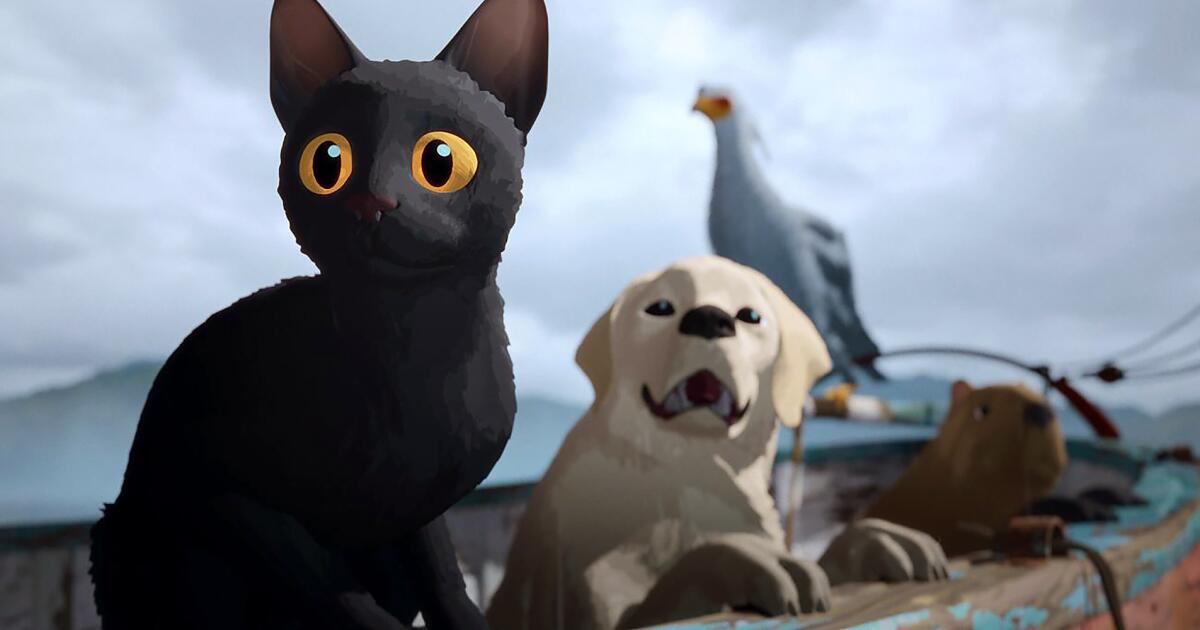Animal welfare becomes the responsibility of the animals themselves in the gorgeous, hypnotic Latvian animated feature “Flow,” in which a solitary cat encounters a catastrophic flood and, along with a dog, a bird, a capybara and a lemur, learns about more than mere survival.
Humans are conspicuously absent in the nature-rich, post-civilization backdrop that director and co-writer Gints Zilbalodis has created for the enchanting follow-up to his promising 2019 feature debut, “Away.” Yet none of the furry or feathered stars of this meditative, wondrous adventure need to wisecrack their way into our hearts. Rather, we get to know animals as animals, not as vaudevillians engineered for maximum cuteness (although the star cat is damn adorable). It’s never explained what caused the rising waters that spur the film’s action, but “Flow” itself could break a dam that’s held back animators from leaning into the beauty of behaviorally authentic beasts.
Yes, “Flow” is wordless, but it’s not silent or language-free. In fact, it’s so attuned to the vocal range of its characters that if, by a certain point, you can’t figure out that one of the capybara’s throaty grunts means “I ate too much” or a particularly harsh squawk from the bird translates as “Leave me alone,” then you probably aren’t reading the room well with your fellow humans either.
Before all this cross-species chat, though, we’re marveling at Zilbalodis’ fluid, shimmering visual majesty in establishing his computer-rendered ecosphere, marked by purposeful, roaming camerawork reminiscent of a cinematic marriage between Spielberg and Cameron at their most revealing and exciting.
The fable-like story, co-written with Matīss Kaža, takes its wandering feline from the comfort zone of a woodsy, abandoned home — where the scariest reality is a roving pack of dogs — and into a newly ocean-logged world. The initial flood is a spectacle, but it’s the climbing waterline that lets this independent cat know it can’t keep counting on reaching higher ground. Refuge comes with a drifting boat and, quickly thereafter, some unfamiliar company. (Lemurs are so weird! Why are dogs so starved for attention? At least the capybara’s nice.) There’s also the occasional appearance from the depths of a friendly whale, now literally swimming among treetops.
Sure, the tiny vessel is an ark of sorts, but for singles only, and with no old man to play God’s messenger. Instead, think an animal-kingdom schoolroom, where the lessons are in teamwork, boldness and conflict resolution. The cat’s journey, which starts with its reflection in a shimmering pond, is the emotional center, but the large, long-legged bird’s story is especially touching, with Miyazaki-like echoes.
It’s hard not to consider humankind’s own future in this region-unspecified, newly aquatic land where mountaintops are islands, northern lights dazzle and finger-like towers that seem man-made dot the background. But there’s a timelessness to the narrative of “Flow” that keeps it from ever feeling like an cautionary environmental tale or dystopian saga.
One of the year’s richest discoveries, “Flow” belongs as much to a timeline of animal-centric masterpieces (“Au hasard Balthazar,” “Gunda,” “EO”) as it does the history of animated indies. And in its simple, generous spirit of giving these creatures palpable narrative power, there’s a profundity: “Flow” might only be imagining their coping skills without us, but it’s a charming, poignant vision of community and perseverance we could stand to be inspired by.

